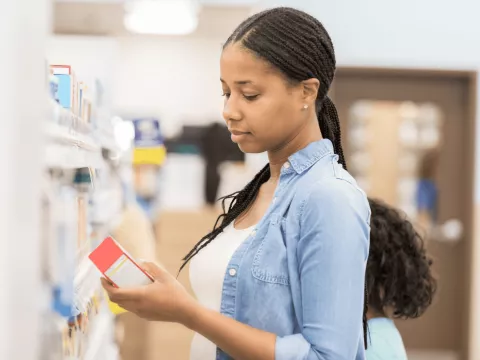- AdventHealth

Choose the health content that’s right for you, and get it delivered right in your inbox.
If an open electronic device with a missing battery is found near your child, head to your nearest emergency department right away for further evaluation.
When it comes to being a parent, you might find that “the little things” often end up being the big things. This idea is usually thought of in a positive light, but there are some “little things” that can quickly end up becoming dangerous if overlooked.
You may have seen or heard of the dangers of lithium batteries for small children, especially button batteries that are easily swallowed (and may be mistaken for candy). We’re here to educate you on the dangers of these small batteries and steps to take if an accident arises. We hope it never does, but we want you to be as prepared as possible if the unexpected happens.
What are the Dangers of Lithium Button Batteries?
These small, coin-shaped batteries can be found in remote controls, thermometers, watches, calculators, hearing aids, flashlights, toys and singing greeting cards. They might not seem like a choking hazard at first, but these batteries can become lodged in a child’s upper airway once ingested and cause serious tissue damage in as little as two hours. They can also become easily lodged in a child’s ears and nostrils.
Lithium-containing button batteries still have a strong current, even after removal from the device they’re powering. Once the battery comes in contact with saliva, an alkalizing reaction can occur and erode through a child’s esophagus — leading to permanent damage and even death.
Symptoms Following Battery Ingestion
Watch and listen for these symptoms if you suspect your child swallowed a button battery:
- Abdominal pain
- Chest discomfort
- Coughing
- Diarrhea
- Difficulty breathing or swallowing
- Drooling
- Fever
- Gagging when attempting to eat or drink
- Refusal to eat
- Vomiting
- Wheezing
If you notice these symptoms, even if you didn’t witness ingestion but suspect it, a quick response can prevent serious damage to your child’s airway.
It’s important to know if a magnet was also swallowed with the battery, as this could cause further injury. X-rays of the child’s entire neck, esophagus and abdomen are typically necessary.
If an open electronic device with a missing battery is found near your child, head to your nearest emergency department right away for further evaluation.
Other steps to follow include:
- Immediately call the 24-hour National Battery Ingestion Hotline at Call1-800-498-8666 or call your poison center at Call1-800-222-1222
- Provide the battery identification number, if you have it. It can be found on the package or from a matching battery
- X-ray must be performed right away to be sure that the battery has gone through the esophagus into the stomach. If the battery remains in the esophagus, it must be removed. Most batteries move on to the stomach and can be allowed to pass by themselves
- Check your child's stools until you know the battery has passed
Here are some things not to do after an accidental battery ingestion:
- Do not let your child eat or drink anything
- Do not make your child vomit
How to Prevent Accidental Battery Ingestion
Swallowing batteries is dangerous, no matter the size. Follow these tips to keep your children safe:
Keep loose batteries and replacement batteries securely locked away
Search your home for devices that may contain button batteries. Don’t allow children to play with toys or devices containing these batteries unsupervised
Secure button battery-controlled toys and devices out of reach of children
Share this lifesaving information with caregivers, friends, family members and babysitters
Emergency Help for Battery Ingestion
Remember, if you suspect your child swallowed a battery, immediately get to your closest ER for help and treatment. It’s also a good idea to contact your child’s pediatrician if they have an on-call provider.
We’re here for you 24/7 for life’s unexpected emergencies. Learn more about how we can help keep you and your family healthy and whole here.




